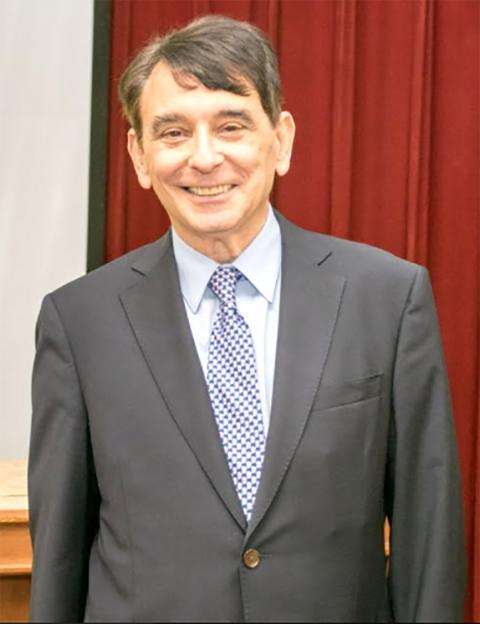The Taiwan Travel Act “atypically recognizes, albeit indirectly, that Taiwan is in fact a ‘country,’” former American Institute in Taiwan (AIT) director William Stanton wrote on Sunday.
“It is symbolically significant that [US] President [Donald] Trump has signed the Taiwan Travel Act rather than allowing it to go quietly into effect absent his positive endorsement,” wrote Stanton, a visiting professor at National Taiwan University’s International College.
Stanton described Trump’s signing on Friday of the Taiwan Travel Act as a “public signal of affirmation rather than private acquiescence.”

Photo courtesy of William Stanton
However, he also called Trump’s delay in signing the act “worrisome,” because he saw it as “another sign of the vacillation we have already witnessed in [Trump’s] policies toward China and Taiwan.”
Stanton said that during his time as AIT director, he “strongly and often advocated what the Taiwan Travel Act now calls for — expanded high-level visits and contacts” between Taiwan and the US.
“All of the restrictions on the conduct of [the US’] ‘non-
diplomatic’ relations with Taiwan were only the self-imposed interpretative creations of US government lawyers,” he wrote.
“There was no reason why we could not simply change them,” he said, adding that with “quiet support” from Washington, he raised the US flag over the AIT for the first time since 1979, when the US broke formal diplomatic ties with Taiwan.
“The Taiwan Travel Act is significant, not only because of the higher level treatment of Taiwan it calls for, but also for its ‘findings,’” Stanton wrote.
These findings include “recognition of Taiwan’s ‘momentous transition to democracy,’” and that Taiwan “serves as a ‘beacon of democracy in Asia,’” he said.
Stanton also highlighted the fifth finding stated by the US Congress in the Taiwan Travel Act: “Visits to a country by United States Cabinet members and other high-ranking officials are an indicator of the breadth and depth of ties between the United States and such country.”
He said he hopes Taiwan will take advantage of this “endorsement of higher-level contacts.”
He said he welcomes the “recent shift in direction of the Trump Administration in dealing with China, and the elevation of advisors in the White House who are more willing to challenge the traditional Kissingerian view that the apparent stability of the overall US bilateral relationship with China always supersedes all individual Chinese policies no matter how harmful they are to US interests.”
The Taiwan Travel Act is “an important milestone in the maturation of US policy toward Taiwan and China,” he added.
The next logical step for the US administration “should be abolishing the AIT Washington office,” he said.
The office “long ago ceased to have any real role in Taiwan’s relations with the United States which require no intermediaries,” he added.

DAREDEVIL: Honnold said it had always been a dream of his to climb Taipei 101, while a Netflix producer said the skyscraper was ‘a real icon of this country’ US climber Alex Honnold yesterday took on Taiwan’s tallest building, becoming the first person to scale Taipei 101 without a rope, harness or safety net. Hundreds of spectators gathered at the base of the 101-story skyscraper to watch Honnold, 40, embark on his daredevil feat, which was also broadcast live on Netflix. Dressed in a red T-shirt and yellow custom-made climbing shoes, Honnold swiftly moved up the southeast face of the glass and steel building. At one point, he stepped onto a platform midway up to wave down at fans and onlookers who were taking photos. People watching from inside

A Vietnamese migrant worker yesterday won NT$12 million (US$379,627) on a Lunar New Year scratch card in Kaohsiung as part of Taiwan Lottery Co’s (台灣彩券) “NT$12 Million Grand Fortune” (1200萬大吉利) game. The man was the first top-prize winner of the new game launched on Jan. 6 to mark the Lunar New Year. Three Vietnamese migrant workers visited a Taiwan Lottery shop on Xinyue Street in Kaohsiung’s Gangshan District (崗山), a store representative said. The player bought multiple tickets and, after winning nothing, held the final lottery ticket in one hand and rubbed the store’s statue of the Maitreya Buddha’s belly with the other,

‘COMMITTED TO DETERRENCE’: Washington would stand by its allies, but it can only help as much as countries help themselves, Raymond Greene said The US is committed to deterrence in the first island chain, but it should not bear the burden alone, as “freedom is not free,” American Institute in Taiwan Director Raymond Greene said in a speech at the Institute for National Defense and Security Research’s “Strengthening Resilience: Defense as the Engine of Development” seminar in Taipei yesterday. In the speech, titled “Investing Together and a Secure and Prosperous Future,” Greene highlighted the contributions of US President Donald Trump’s administration to Taiwan’s defense efforts, including the establishment of supply chains for drones and autonomous systems, offers of security assistance and the expansion of

Japan’s strategic alliance with the US would collapse if Tokyo were to turn away from a conflict in Taiwan, Japanese Prime Minister Sanae Takaichi said yesterday, but distanced herself from previous comments that suggested a possible military response in such an event. Takaichi expressed her latest views on a nationally broadcast TV program late on Monday, where an opposition party leader criticized her for igniting tensions with China with the earlier remarks. Ties between Japan and China have sunk to the worst level in years after Takaichi said in November that a hypothetical Chinese attack on Taiwan could bring about a Japanese